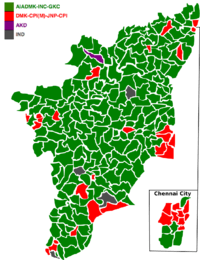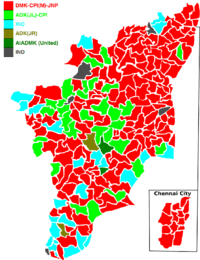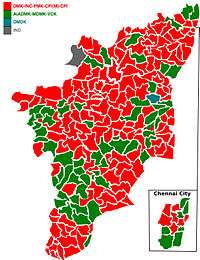Elections in Tamil Nadu

Elections in Tamil Nadu are conducted every five years to elect the State assembly and its share of members to the Lok Sabha. There are 234 assembly constituencies and 39 Lok Sabha constituencies. The state has conducted 15 assembly elections and 16 Lok Sabha elections since independence.
Assembly constituencies
Tamil Nadu has 234 assembly constituencies. The Chief Minister of the state is elected by legislators of the political party or coalition commanding an assembly majority, and serves a five-year term with a provision of re-election. The Governor is the head of state, but his or her role is largely ceremonial.
Lok Sabha constituencies
The Lok Sabha is the directly elected lower house of the Parliament of India. As of 2014 there have been sixteen Lok Sabhas elected by the people of India. Tamil Nadu has 39 Lok Sabha constituencies.
Rajya Sabha
The Rajya Sabha is the indirectly elected upper house of the Parliament of India. Rajya Sabha members are elected by state legislators of Tamil Nadu who elect a total of 18 members. Election to Rajya Sabha held in 1996, 2013.
Assembly elections
The last assembly election took place in May 2016, which resulted in AIADMK and its allies winning.
Madras Presidency
The state of Tamil Nadu had is beginnings in the Madras Presidency which was created in 1685. Initially, the Presidency was administered by a President who was advised by an Executive Council in the administration of the province. A legislative council came into being in 1861 by the Indian Councils Act 1861. The members of the council were nominated. In November 1920, by the Montagu-Chelmsford reforms, the existing structure of the legislative council was modified by the addition of elected members and the first elections were held in December 1920. From 1920 till India's independence in 1947, with the exception of the Second World War period, regular elections were held on a three-year basis. Initially, the electorate was limited to zamindars, district board chairmans and influential people. In 1935, the electorate was enlarged by the Government of India Act 1935. In 1952, the electorate was finally large enough to cover all legal citizens of the province over the age of 18.
The Justice Party won a majority in the assembly in the 1920, 1923 and 1930 elections. It formed a minority government in the 1934 elections and lost in the 1926, 1937 and 1946 elections. The assembly was dissolved in 1939 when the Congress ministry of C. Rajagopalachari resigned and no elections were held in 1940 and 1943. The Swaraj Party won majorities in the 1926 and the 1934 elections but did not form the government. It did not contest the 1920 elections and contested and won as a part of the Indian National Congress in 1937.
Pre-Independence elections
Madras Presidency Legislative Council election
| Year | Election | Winning Party/Coalition | Leader | Elected Chief Minister (Party) | Opposition | Opposition Leader |
|---|---|---|---|---|---|---|
| 1920 | First Presidency Council | Justice Party (India) | P. Theagaroya Chetty | A. Subbarayalu Reddiar (Justice Party) | Independents | n/a |
| 1923 | Second Presidency Council | Justice Party (India) | P. Theagaroya Chetty | A. Subbarayalu Reddiar (Justice Party) | Anti-ministerial | |
| 1926 | Third Presidency Council | Swaraj Party | S. Srinivasa Iyengar | P. Subbarayan (Nonpartisan) | Justice Party (India) | Raja of Bobbili |
| 1930 | Fourth Presidency Council | Justice Party (India) | P. Munuswamy Naidu | P. Munuswamy Naidu (Justice Party) | Independent Nationalist Party | P. Subbarayan |
| 1934 | Fifth Presidency Council | Swaraj Party | Sathyamurthy | Raja of Bobbili (Justice Party) | Justice Party (India) | Raja of Bobbili |
Madras Presidency Legislative Assembly election
| Year | Election | Winning Party/Coalition | Chief Minister | Opposition | Opposition Leader |
|---|---|---|---|---|---|
| 1937 | First Assembly | Indian National Congress* | C. Rajagopalachari | Justice Party (India) | Raja of Bobbili |
| 1946 | Second Assembly | Indian National Congress | 1) T. Prakasam 2) Omandur Ramaswamy Reddiar 3) P. S. Kumaraswamy Raja |
All-India Muslim League | Muhammad Ismail |
Post-Independence elections
Madras State Legislative Assembly election
The Madras state was created in 1950 when India became a republic. In 1968, the name of Madras state was changed to Tamil Nadu.
| Year | Election | Winning Party/Coalition | Chief Minister |
|---|---|---|---|
| 1952 | First Assembly | Indian National Congress* | 1) C. Rajagopalachari 2) K. Kamaraj |
| 1957 | Second Assembly | Indian National Congress | K. Kamaraj(2) |
| 1962 | Third Assembly | Indian National Congress | 1)K. Kamaraj(3) 2) M. Bakthavatsalam |
| 1967 | Fourth Assembly | Dravida Munnetra Kazhagam | 1) C.N. Annadurai 2) M. Karunanidhi |
Tamil Nadu Legislative Assembly election

| Year | Election | Winning Party/Coalition | Chief Minister |
|---|---|---|---|
| 1971 | Fifth Assembly | Dravida Munnetra Kazhagam | M. Karunanidhi (2) |
| 1977 | Sixth Assembly | Anna Dravida Munnetra Kazhagam | M.G. Ramachandran |
| 1980 | Seventh Assembly | Anna Dravida Munnetra Kazhagam | M.G. Ramachandran (2) |
| 1984 | Eighth Assembly | Anna Dravida Munnetra Kazhagam | M.G. Ramachandran (3) Janaki Ramachandran |
| 1989 | Ninth Assembly | Dravida Munnetra Kazhagam | M. Karunanidhi (3) |
| 1991 | Tenth Assembly | Anna Dravida Munnetra Kazhagam ADMK-164; ADMK+ 225/234 DMK-2, DMK+ 7/234) |
J. Jayalalithaa |
| 1996 | Eleventh Assembly | Dravida Munnetra Kazhagam (DMK + Tamil Manila + CPI = 221/234; ADMK - 4 seats) |
M. Karunanidhi (4) |
| 2001 | Twelfth Assembly | Anna Dravida Munnetra Kazhagam ADMK+ 196/234 ADMK-132, TMC-23, PMK-20, INC-7 DMK+ 37; DMK-31 |
J. Jayalalithaa (2) O. Panneerselvam J. Jayalalithaa (3) |
| 2006 | Thirteenth Assembly | Dravida Munnetra Kazhagam† DMK+ 163/234, DMK-96, INC-34, PMK-18 AIADMK+ 69/234, ADMK-61/69 |
M. Karunanidhi (5) |
| 2011 | Fourteenth Assembly | Anna Dravida Munnetra Kazhagam AIADMK+ 203/234, ADMK-150/203, DMDK-29 CPI/M 10+9 DMK+ 31 (DMK-23, INC-5, PMK-3) |
J. Jayalalithaa (4) O. Paneerselvam (2) J. Jayalalithaa (5) |
| 2016 | Fifteenth Assembly | Anna Dravida Munnetra Kazhagam + 134 DMK+ 98 NTK 0 PWF 0 |
J. Jayalalithaa (6) |
END
- Note: In 1952, no party could form a majority, which resulted in the first government in the state that was formed without a majority.
†: Indicates a coalition government, since no single party could gain a majority of seats.
By-elections
| Election Year | Winning Party/Coalition | Seats Won - Seats Lost |
|---|---|---|
| 1997–98 | DMK | 3-0 |
| 1999–2000 | DMK-MADMK | 3-2 |
| 2002–03 | AIADMK | 5-0 |
| 2004–05 | AIADMK | 2-1 |
| 2006–07 | DMK-INC | 2-0 |
| 2009–10 | DMK-INC | 9-0 |
Election Maps (1977-2016)
| This article is part of a series on |
| Government and Politics of Tamil Nadu |
|---|
 |
|
State of Tamil Nadu தமிழ்நாடு மாநிலம் |
|
 1977: AIADMK wins its debut election in a four-cornered contest and MGR is elected as CM for the first time.
1977: AIADMK wins its debut election in a four-cornered contest and MGR is elected as CM for the first time. 1980: AIADMK wins again and MGR is elected as CM for the second time.
1980: AIADMK wins again and MGR is elected as CM for the second time. 1984: AIADMK wins for the third straight time and MGR is elected as CM for the third time.
1984: AIADMK wins for the third straight time and MGR is elected as CM for the third time. 1989: DMK wins for the third time in a four-cornered contest and Karunanidhi is elected CM for the third time.
1989: DMK wins for the third time in a four-cornered contest and Karunanidhi is elected CM for the third time. 1991: AIADMK wins in a landslide and Jayalalithaa is elected CM for the first time.
1991: AIADMK wins in a landslide and Jayalalithaa is elected CM for the first time. 1996: DMK wins in a landslide and Karunanidhi is elected CM for the fourth time.
1996: DMK wins in a landslide and Karunanidhi is elected CM for the fourth time. 2001: AIADMK wins with a grand alliance and Jayalalithaa is elected CM for the second time.
2001: AIADMK wins with a grand alliance and Jayalalithaa is elected CM for the second time. 2006: DMK wins a majority government by alliance with coalition parties and Karunanidhi is elected CM for the fifth time.
2006: DMK wins a majority government by alliance with coalition parties and Karunanidhi is elected CM for the fifth time. 2011: AIADMK wins and Jayalalithaa is elected CM for the third time.
2011: AIADMK wins and Jayalalithaa is elected CM for the third time. 2016: AIADMK wins and Jayalalithaa is elected CM for the Fourth time.
2016: AIADMK wins and Jayalalithaa is elected CM for the Fourth time.
Lok Sabha elections

15 Lok Sabha elections have been contested in India since independence starting 1951. The elections held in Tamil Nadu are listed below.
| Year | Lok Sabha Election | Winning Party/Coalition | |
|---|---|---|---|
| 1951 | First Lok Sabha | Indian National Congress | |
| 1957 | Second Lok Sabha | Indian National Congress | |
| 1962 | Third Lok Sabha | Indian National Congress | |
| 1967 | Fourth Lok Sabha | United Front (DMK/SWA/CPM/ML)* | |
| 1971 | Fifth Lok Sabha | Congress (Indira) alliance (DMK/INC/CPI/FBL/ML) | |
| 1977 | Sixth Lok Sabha | Congress (Indira) alliance (ADMK/INC/CPI)* 34/39; | |
| 1980 | Seventh Lok Sabha | Congress (Indira) alliance (DMK/INC/ML) - 37/39, AIADMK - 2 seats | |
| 1984 | Eighth Lok Sabha | Congress alliance (ADMK/INC) - 37 out of 39 seats | |
| 1989 | Ninth Lok Sabha | Congress alliance (ADMK/INC) - 38/39 | |
| 1991 | Tenth Lok Sabha | Congress alliance (ADMK/INC) - 39/39 seats | |
| 1996 | Eleventh Lok Sabha | United Front (DMK/TMC/CPI) - 39/39 seats | |
| 1998 | Twelfth Lok Sabha | National Democratic Alliance (ADMK/BJP/PMK/MDMK/JP/TRC) - 30/39, DMK+TMC= 8-9 seats | |
| 1999 | Thirteenth Lok Sabha | National Democratic Alliance (DMK/BJP/PMK/MDMK/MADMK) - 26/39 seats | |
| 2004 | Fourteenth Lok Sabha | Democratic Progressive Alliance (DMK/INC/PMK/MDMK/CPI/CPM) - 39/39 | |
| 2009 | Fifteenth Lok Sabha | United Progressive Alliance (DMK/INC/VCK) 27 out of 39; ADMK - 10-12 seats | |
| 2014 | Sixteenth Lok Sabha | All India Anna Dravida Munnetra Kazhagam - 37/39 |
- Note: In 1967, DMK and its 25 newly elected MPs supported the Congress, under Indira Gandhi after the election.
- Note: Even though ADMK supported and campaigned with Congress for the 1977 election, after the loss nationally, ADMK and its newly elected 17 MPs supported Morarji Desai and the Janata Party and its alliance, giving them 20 seats (ADMK, NCO) while the other 17 seats (INC, CPI) and 2 seats (DMK) were in the opposition with Indira Gandhi.
Election Maps (1977-2014)
 1977: INC & AIADMK wins in a landslide, by grabbing 34 out of 39 seats in the state. INC loses the election nationally to the JP alliance. After the loss, AIADMK supported the JP alliance and AIADMK was part of the JP government under Morarji Desai.
1977: INC & AIADMK wins in a landslide, by grabbing 34 out of 39 seats in the state. INC loses the election nationally to the JP alliance. After the loss, AIADMK supported the JP alliance and AIADMK was part of the JP government under Morarji Desai. 1980: INC(I) & DMK wins in a landslide, by grabbing 37 out of 39 seats in the state. INC(I) wins the election nationally and DMK was part of the INC government under Indira Gandhi.
1980: INC(I) & DMK wins in a landslide, by grabbing 37 out of 39 seats in the state. INC(I) wins the election nationally and DMK was part of the INC government under Indira Gandhi. 1984: INC & AIADMK wins in a landslide, by grabbing 37 out of 39 seats in the state. INC wins the election nationally and AIADMK was part of the INC government under Rajiv Gandhi.
1984: INC & AIADMK wins in a landslide, by grabbing 37 out of 39 seats in the state. INC wins the election nationally and AIADMK was part of the INC government under Rajiv Gandhi. 1989: INC & AIADMK wins in a landslide, by grabbing 38 out of 39 seats in the state. INC loses the election nationally to the NF alliance, which includes the DMK who was part of the JD government under V.P. Singh.
1989: INC & AIADMK wins in a landslide, by grabbing 38 out of 39 seats in the state. INC loses the election nationally to the NF alliance, which includes the DMK who was part of the JD government under V.P. Singh. 1991: INC & AIADMK swept the state winning all 39 seats. INC wins the election nationally and AIADMK was part of the INC government under P. V. Narasimha Rao.
1991: INC & AIADMK swept the state winning all 39 seats. INC wins the election nationally and AIADMK was part of the INC government under P. V. Narasimha Rao. 1996: Newly formed alliance UF, which includes DMK & TMC(M) swept the state winning all 39 seats. UF forms the government, with outside support from INC, nationally after BJP government failed to last in a few days and DMK-TMC(M)-CPI was part of the JD government under H. D. Deve Gowda.
1996: Newly formed alliance UF, which includes DMK & TMC(M) swept the state winning all 39 seats. UF forms the government, with outside support from INC, nationally after BJP government failed to last in a few days and DMK-TMC(M)-CPI was part of the JD government under H. D. Deve Gowda. 1998: Newly formed alliance NDA, which includes BJP & AIADMK wins 30 out of 39 seats in the state. NDA wins the election nationally and AIADMK-PMK-MDMK-JP-TRC was part of the BJP government under Atal Bihari Vajpayee.
1998: Newly formed alliance NDA, which includes BJP & AIADMK wins 30 out of 39 seats in the state. NDA wins the election nationally and AIADMK-PMK-MDMK-JP-TRC was part of the BJP government under Atal Bihari Vajpayee. 1999: New elections were called after AIADMK quits the NDA. NDA, which now includes DMK wins 26 out of 39 seats in the state. NDA wins the election nationally for the second straight-time and DMK-PMK-MDMK-MADMK was part of the BJP government under Atal Bihari Vajpayee.
1999: New elections were called after AIADMK quits the NDA. NDA, which now includes DMK wins 26 out of 39 seats in the state. NDA wins the election nationally for the second straight-time and DMK-PMK-MDMK-MADMK was part of the BJP government under Atal Bihari Vajpayee. 2004: Newly formed alliance DPA, which includes INC alliance (DMK, PMK, MDMK) and Left Front swept the state winning all 39 seats. UPA wins the election nationally and DMK-PMK-MDMK was part of the INC government under Manmohan Singh, while the Left Front (CPI & CPI(M)) gave outside support.
2004: Newly formed alliance DPA, which includes INC alliance (DMK, PMK, MDMK) and Left Front swept the state winning all 39 seats. UPA wins the election nationally and DMK-PMK-MDMK was part of the INC government under Manmohan Singh, while the Left Front (CPI & CPI(M)) gave outside support. 2009: A shrunken UPA alliance, which includes INC & DMK wins 27 out of 39 seats in the state. UPA wins the election nationally for the second straight time and DMK-INC-VCK was part of the INC government under Manmohan Singh
2009: A shrunken UPA alliance, which includes INC & DMK wins 27 out of 39 seats in the state. UPA wins the election nationally for the second straight time and DMK-INC-VCK was part of the INC government under Manmohan Singh- 2014: AIADMK forming no alliance wins in a landslide grabbing 37 out of 39 seats in a four-cornered race. NDA alliance won the remaining 2 seats. Since BJP under the leader Narendra Modi was able to get majority on its own, AIADMK and its 37 MPs were part of the opposition being the third largest party nationwide following BJP and INC.
See also
References
External links
| Wikimedia Commons has media related to Elections in Tamil Nadu. |
- Tamilnadu Election Polls 2016
- Election Commission of India
- Tamil Nadu Legislative Assembly
- Indian Elections
- Tamil Nadu Assembly Election 2011